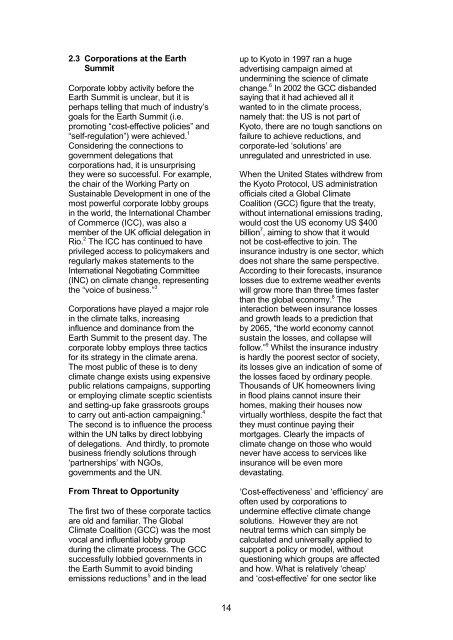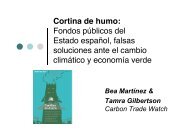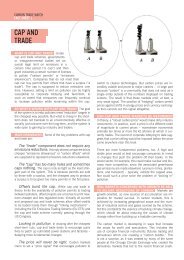The Sky is Not the Limit: - Carbon Trade Watch
The Sky is Not the Limit: - Carbon Trade Watch
The Sky is Not the Limit: - Carbon Trade Watch
- No tags were found...
You also want an ePaper? Increase the reach of your titles
YUMPU automatically turns print PDFs into web optimized ePapers that Google loves.
2.3 Corporations at <strong>the</strong> EarthSummitCorporate lobby activity before <strong>the</strong>Earth Summit <strong>is</strong> unclear, but it <strong>is</strong>perhaps telling that much of industry’sgoals for <strong>the</strong> Earth Summit (i.e.promoting “cost-effective policies” and“self-regulation”) were achieved. 1Considering <strong>the</strong> connections togovernment delegations thatcorporations had, it <strong>is</strong> unsurpr<strong>is</strong>ing<strong>the</strong>y were so successful. For example,<strong>the</strong> chair of <strong>the</strong> Working Party onSustainable Development in one of <strong>the</strong>most powerful corporate lobby groupsin <strong>the</strong> world, <strong>the</strong> International Chamberof Commerce (ICC), was also amember of <strong>the</strong> UK official delegation inRio. 2 <strong>The</strong> ICC has continued to haveprivileged access to policymakers andregularly makes statements to <strong>the</strong>International Negotiating Committee(INC) on climate change, representing<strong>the</strong> “voice of business.” 3Corporations have played a major rolein <strong>the</strong> climate talks, increasinginfluence and dominance from <strong>the</strong>Earth Summit to <strong>the</strong> present day. <strong>The</strong>corporate lobby employs three tacticsfor its strategy in <strong>the</strong> climate arena.<strong>The</strong> most public of <strong>the</strong>se <strong>is</strong> to denyclimate change ex<strong>is</strong>ts using expensivepublic relations campaigns, supportingor employing climate sceptic scient<strong>is</strong>tsand setting-up fake grassroots groupsto carry out anti-action campaigning. 4<strong>The</strong> second <strong>is</strong> to influence <strong>the</strong> processwithin <strong>the</strong> UN talks by direct lobbyingof delegations. And thirdly, to promotebusiness friendly solutions through‘partnerships’ with NGOs,governments and <strong>the</strong> UN.From Threat to Opportunity<strong>The</strong> first two of <strong>the</strong>se corporate tacticsare old and familiar. <strong>The</strong> GlobalClimate Coalition (GCC) was <strong>the</strong> mostvocal and influential lobby groupduring <strong>the</strong> climate process. <strong>The</strong> GCCsuccessfully lobbied governments in<strong>the</strong> Earth Summit to avoid bindingem<strong>is</strong>sions reductions 5 and in <strong>the</strong> leadup to Kyoto in 1997 ran a hugeadvert<strong>is</strong>ing campaign aimed atundermining <strong>the</strong> science of climatechange. 6 In 2002 <strong>the</strong> GCC d<strong>is</strong>bandedsaying that it had achieved all itwanted to in <strong>the</strong> climate process,namely that: <strong>the</strong> US <strong>is</strong> not part ofKyoto, <strong>the</strong>re are no tough sanctions onfailure to achieve reductions, andcorporate-led ‘solutions’ areunregulated and unrestricted in use.When <strong>the</strong> United States withdrew from<strong>the</strong> Kyoto Protocol, US admin<strong>is</strong>trationofficials cited a Global ClimateCoalition (GCC) figure that <strong>the</strong> treaty,without international em<strong>is</strong>sions trading,would cost <strong>the</strong> US economy US $400billion 7 , aiming to show that it wouldnot be cost-effective to join. <strong>The</strong>insurance industry <strong>is</strong> one sector, whichdoes not share <strong>the</strong> same perspective.According to <strong>the</strong>ir forecasts, insurancelosses due to extreme wea<strong>the</strong>r eventswill grow more than three times fasterthan <strong>the</strong> global economy. 8 <strong>The</strong>interaction between insurance lossesand growth leads to a prediction thatby 2065, “<strong>the</strong> world economy cannotsustain <strong>the</strong> losses, and collapse willfollow.” 9 Whilst <strong>the</strong> insurance industry<strong>is</strong> hardly <strong>the</strong> poorest sector of society,its losses give an indication of some of<strong>the</strong> losses faced by ordinary people.Thousands of UK homeowners livingin flood plains cannot insure <strong>the</strong>irhomes, making <strong>the</strong>ir houses nowvirtually worthless, despite <strong>the</strong> fact that<strong>the</strong>y must continue paying <strong>the</strong>irmortgages. Clearly <strong>the</strong> impacts ofclimate change on those who wouldnever have access to services likeinsurance will be even moredevastating.‘Cost-effectiveness’ and ‘efficiency’ areoften used by corporations toundermine effective climate changesolutions. However <strong>the</strong>y are notneutral terms which can simply becalculated and universally applied tosupport a policy or model, withoutquestioning which groups are affectedand how. What <strong>is</strong> relatively ‘cheap’and ‘cost-effective’ for one sector like14











